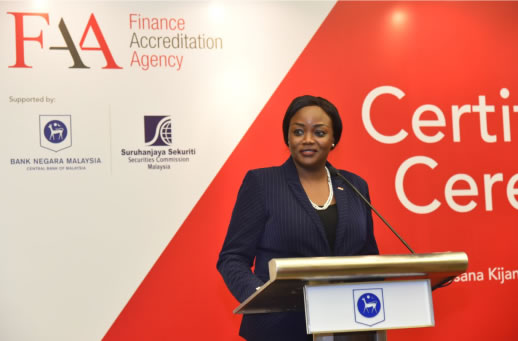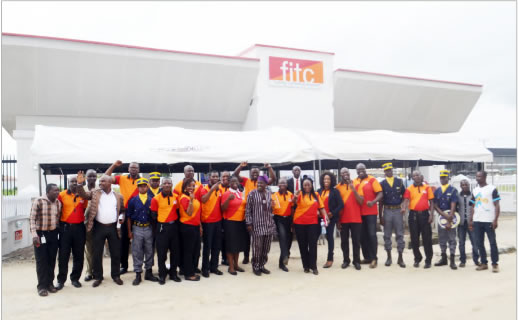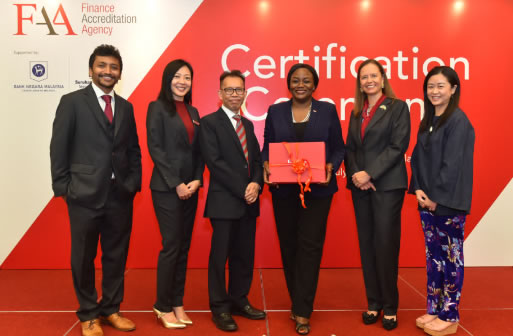Great milestones at FITC

Summary
When I joined FITC, the longest project was 6-9 months and led by external associates. But now we have projects with duration of about two years being delivered by our staff alone.
In this interview, Lucy Surhyel Newman, DBA (CPT), discusses the recent milestones at FITC and her reflections and legacy in human capital development in the Nigerian finance sector.
Financial Nigeria (FN): What are the latest milestones at FITC?
Lucy Surhyel Newman (LSN): FITC has had many milestones recently. These include the big one, which is the accreditation of 10 out of FITC's 15 courses. The courses were scheduled for accreditation by the Finance Accreditation Agency (FAA) of Malaysia in November 2017. I received the certification of accreditation at the award ceremony, which held on 3rd July, 2018 at Sasana Kijang, a centre of knowledge and learning excellence established by the Bank Negara, the Malaysian central bank, in Kuala Lumpur. The remaining five courses in the batch will be submitted for the rigorous accreditation process this July, with target accreditation by close of 2018.
Another recent milestone is the launch of three publications at the recently held inaugural edition of the FITC Thought Leadership Series, which took place in Lagos on 24th May, 2018. The three publications are profound. One is “Fraud and Forgery in the Nigerian Banking Industry.” It is a 15-year trend analysis on the subject-matter. The second is “A Study of the Framework for Credit Management in Banks within Nigeria.” It includes data collected between 2011 and 2015 with observations in adjustments in practices, based on impact of industry and regulatory initiatives. The third publication is the new edition of “The Journal of Banking and Finance,” which focuses on the management of foreign exchange rates and its implications on the macroeconomy.

FITC also made some re-alignments within the management team to strengthen the bench and rejig our services for enhanced value to our stakeholders. It may be recalled that in 2014, FITC made a deliberate move in diversifying its workforce. We integrated a programme that specifically sought for millennials. Then in 2016 and 2017, there were internal re-alignments to explore opportunities for our people to make transitions in line with competencies developed. From 2017 to mid-2018, there were major re-alignments to enhance the leadership bench and deepen our service offerings, while enhancing our quality-conscious and high-compliance environment. These realignments in the leadership team were done via some new recruitments and promotions, as well as specific capacity enhancement interventions.
One more recent milestone out of many, that perhaps we may not have another chance to mention in this interview, is the profound progress made on the FITC Lekki Campus, a project situated on 6.48 hectares of land. FITC's aspirations for the Lekki Campus is to have a green environment with modern designs that provide a high quality of life for habitants and visitors. So far, the land clearing, fencing and exterior interlocking roads have been completed. Perimeter lighting and basic requirements already exist, while external landscaping has commenced. All these have provided the foundation required for the next phase of development.
The campus is to provide a minimum of 3- to 4-star accommodation for up to 150 participants, conferencing, staff quarters, utilities area and recreation. It is FITC's aspiration that has been in the works over the past one-and-a-half decades. The FITC Board, Management and Staff are particularly delighted about the progress on this project in recent years.
FN: What factors influenced FITC's decision to seek accreditation for its courses from the FAA, an institution affiliated to the Bank Negara, in faraway Malaysia?
LSN: Financial Nigeria readers and FITC stakeholders may recall that in 2017, FITC invested in having three of its senior officers undergo the FAA Certified Training Professional (CTP) programme. FITC also signed up 15 courses for accreditation, most of which were from the Competency Management Framework (CMF) for Banks, as introduced by the Central Bank of Nigeria (CBN), in 2012. FITC truly appreciates the professional and constructive engagement that FAA is providing through the rigorous programme accreditation process and the various stages of the CTP.

The FAA accreditation has provided an independent assurance of quality of the applicable courses, while the skills attained from the CTP continue to positively impact programme design, delivery and evaluation in FITC.
There are three important factors that are profound in this development. First, I think great things happen when leaders and board members have a share of mind of the organisations they are affiliated with, as they travel the world and network, while recognizing opportunities for partnerships. FITC's former Chairman, the former CBN Deputy Governor for Financial System Stability (FSS), Dr. O. J. Nnanna, who is now Deputy Governor for Economic Policy at the CBN, met with an official of FAA on a programme in Singapore and subsequently advised him to contact FITC, based on his understanding of the FITC mandate and initiatives, as well as similarity between FITC and the FAA. This, and the focus on strategy and governance, enabled the management and new FITC Board Chairman & CBN Deputy Governor FSS, Mrs. Aisha Ahmad CFA, to continue with the agenda.
The second factor is disciplined focus on execution of strategy. It may be recalled that in 2006, all key regulatory institutions and select industry leaders in the Nigerian Financial System (FITC inclusive), came together and developed the Financial System Strategy 2020 Blueprint (FSS 2020). FITC had the privilege of Chairing the Human Capital Development Implementation Committee from inception to 2013. Initiatives within the Committee's report included an Approved Persons' Regime, a Financial Literacy Initiative, Competency Management Framework (CMF), etc.
The role of FITC in FSS 2020 was a key attraction for me, especially during my recruitment process, which lasted from November 2008 to April 2009. Assuming my position as MD/CEO, I became a disciple of the project and cherished FITC's role and contributions. FITC now has the ability to implement its role in a systemic strategy, as a self-driven and focused stakeholder without any prodding. This kept us on track within the FSS 2020 plan.
Most of our interventions and internal FITC capacity initiatives were aimed at positioning us to effectively play our role in an FSS 2020 environment, as envisioned. In 2012, when the CBN issued the implementation guideline for the CMF for Banks, providing clarity on FITC's role, we were ready!
We engaged the industry on implementation and then designed a Competency-Based Training Calendar for Banks in 2014; with further consultations, we introduced the programmes as in-plants to banks primarily, since January 2015. With a good run of the training calendar in FY 2015 and 2016, and by incorporating industry feedback from sessions and based on patronage of the courses, FITC instantly recognized the opportunities with the FAA programme accreditation at first meeting!
FITC's accreditation of 15 courses, most of which are within the controlled functions in the CMF, is based on the logic that the controlled function competencies have profound impact on bank quality and sustainability. Thus, given the focus of FSS 2020 strategy and CMF, FITC picked 15 validated new areas of competency.
Third, the three benchmarked financial systems in the world for the FSS 2020 Human Capital Development Implementation Committee were South Korea, Singapore and Dubai, all neighbours with Malaysia. The FAA, an agency affiliated with Bank Negara and chaired by a Deputy Governor of the Bank, has a semblance to the FITC.
FN: What should the stakeholders of FITC expect next?
LSN: With these accreditations, FITC is moving to the next big thing. We have started our next project, which is the development of a Competency Assessment System (CAS) for the industry. This was promised at FITC's presentation to the Nigerian Bankers' Committee in February 2017. The CAS is expected to be ready in Q4 of 2018. It will be based on generic Job Descriptions (JDs) for the industry through all grades and functional areas defined in the CMF. FITC is developing the applicable plain vanilla JDs. The CMF and CAS are dual projects that FITC is investing in as a service to the industry. The final sharing of outputs with other stakeholders of the CMF, including the CBN, the Nigerian Deposit Insurance Corporation (NDIC) and the Chartered Institute of Bankers of Nigeria (CIBN), will be done before launch. The CAS will enable prescriptive development interventions, via the Accredited Courses, role adjustments, coaching, etc.

FN: You are in the final year of your cumulative 10-year appointment, as Managing Director and CEO of FITC. What are your reflections on your experience in this role?
LSN: Without a blink, I can truthfully say that I have thoroughly enjoyed my stay at FITC. From the start, I have never really seen or taken my role as a job, but rather as a mission to the financial system. I am a life learner and cherish the fact that in the course of this role, I have met and had the privilege of learning with and from the best and brightest in this country, Africa and the world. I have had the privilege of making profound contributions that would, God willing, stand the test of time.
I have had the privilege of joining to walk in the path of personal and professional developments of my colleagues; their successes have become my successes. At FITC, we are a family. As I tell the FITC Board very often, I love my role at FITC and honestly, I can do it for free, delightfully.
FN: As you serve out your tenure, are you confident that your legacy will survive at the institution and in the financial services sector?
LSN: When I resumed at FITC in 2009, the next levels of staff to the MD/CEO were Principal Managers and Managing Consultants (technically, Principal Consultants). Then we had a Professor that was on Sabbatical at FITC. During my interview, I asked if there was any internal candidate and there was none. I undertook to build the bench and in 2010, presented a leadership pipeline development plan, which was approved. That plan has gone through multiple levels of refinement as our projects and services become more complex and extended.
We are now more evidence-based in approach. Today, we have Associate Directors, a Deputy General Manager, a Principal Consultant, Senior Managers, Mangers and an Executive Director. Our pool of associates is in excess of 380 persons from almost all states within the country and around the world. Most of our services are projects we ourselves have benefited from.
When I joined FITC, the longest project was 6-9 months duration and led by external associates. But now we have projects with duration of over two years being delivered mainly by our staff alone. We now drive these projects through handholding implementation with little or no support from external associates.
I have been a transformational leader with a Japanese-management and continued-performance-improvement orientation. Team work, self-directed learning and coaching are natural outcomes of this leadership style. I am, therefore, hopeful that my colleagues are more than able to keep the ship sailing after my tenure in office as MD/CEO.
The FITC Board is usually highly knowledgeable, involved within best practice corporate governance principles and passionate about the mandate. My prayer is that in line with the Board's practice of ensuring an objective process based on knowledge and competence, the decision on my successor will be one that ensures FITC continues to grow along this path. I am hopeful that the Board will make the right decision.
On my part, I have taken all humanly expedient steps to develop multiple generations of leaders who are able to effectively run the organisation into the foreseeable future, because I don't think anyone who has been a part of the journey would allow what has been attained, take a downward spiral. For an organization like FITC, growing its leaders is an easier path because of the breadth of its mandate and the intellectual capacities required across all levels, especially at the top. So, I undertake to work closely with the Board within the limits of the office of the CEO, in ensuring sustainability and continued growth. This will be my focus leading to early May 2019 when my tenure ends.

FN: Of all the accomplishments recorded during your leadership at FITC, which are more important to you, both professionally and personally?
LSN: I have been in the saddle for almost 10 years. The 10-year transformation of FITC is profoundly gratifying to me as a performance improvement technologist. FITC's net worth has grown almost 300%; number of participants has grown almost 65%. We now have participants across West, East and Central Africa with the SADC region attending programmes in FITC. We have had multiple collaborations with global brands in our space, including the International Finance Corporation (IFC), the African Corporate Governance Network (ACGN) and now the Finance Accreditation Agency (FAA), while retaining our traditional collaborations through the years.
Many of my colleagues have obtained their Master's degrees, various professional certifications and a few doctoral degrees. Many have married, seen their children get married with children, become grandparents, had their children graduate, built homes, etc. Many also have wonderful roles and qualifications, making great contributions within their professional networks and associations. These personal and family successes are profoundly important and gratifying to me.
When I joined FITC, we were in rented apartments at Shippers Towers. Today, we own the property we reside in at Yaba; it is well branded inside out. We have also made so much progress on the Lekki Project and some expansions around our location at Yaba. Our corporate brand goodwill in the system in Nigeria and the West Africa sub-region especially, is profound. FITC has from inception, nursed the plan for a campus but lost two properties from the mid-1990s to about 15 years ago. Lekki was almost lost too, but I am delighted that we have that sorted and well on our way to realising this long-held aspiration.
I am delighted about our peer-benchmarked domestic and international awards, from 2012 to date. I think I should just stop here for now and continue in my up-coming book.
FN: Are you retiring or you are going to transition into other responsibilities after May 2019?
LSN: Interesting question! I wish I could pass on this. However, I have the feeling that you wouldn't let go, unless you have a response! So, here it is.
For me, less than 100% is not good enough. I also like to do what I can see as a mission and use the opportunity to make meaningful contribution, otherwise, it is not worth it. What I do must also align with my personal goals and values as a Kingdom-focused Christian, doing meaningful work for the good of all, irrespective of gender, faith, tribe, culture, and without any guile. So, a sense of mission is the key determinant for me.
I focus on today and let God lead for tomorrow and next, as He wills. My experience in life and work so far, is that, when I give the present 100%, it is usually the seed for tomorrow. So, we will see. God willing, Financial Nigeria will have the first scoop. For now, I need to focus on finishing my mission at FITC well for the benefit of the organization and the system in the short, medium and long term.
Recent Interviews
Latest Blogs
- Tackling antibiotic resistance through safer food systems
- Big government, little governance
- What will matter in Nigeria in 2026
- The Museum of West African Art saga
- The complexity and complication of Nigeria’s insecurity
Latest News
- Pan-African nonprofit appoints Newman as Advisory and Executive Boards ...
- Dollar slumps as Fed independence comes under fire
- Abebe Aemro Selassie to retire as Director of African Department at IMF
- UN adopts new consumer product safety principles
- World Bank approves $500m loan for small businesses in Nigeria












